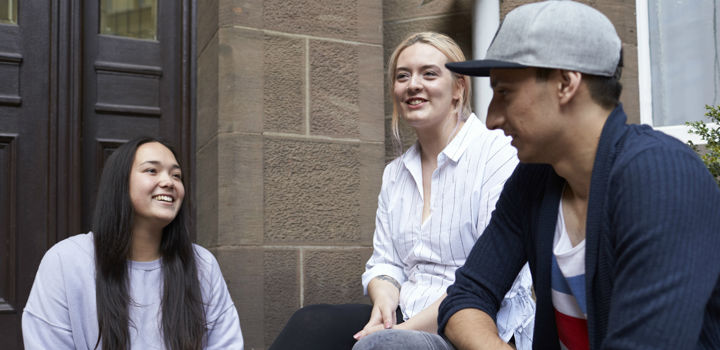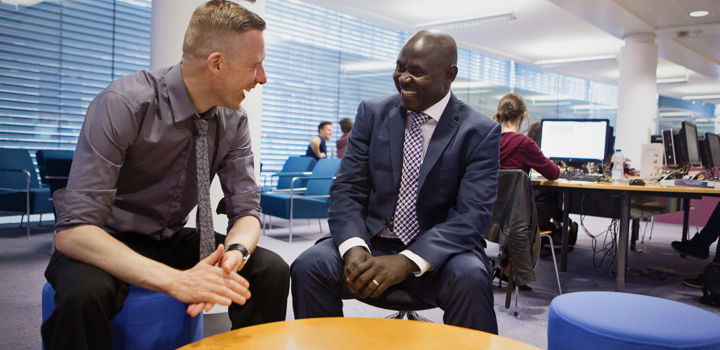Scholarships
The scholarships below are open to international students and those applying from England, Wales and Northern Ireland with a 2.1 or above for a postgraduate course.
The Data Lab, Scotland's Innovation Centre for Data and AI, has two fee-paying scholarships for this MSc for 2025-26. The scholarship covers course fees, which are paid directly to the University. Eligibility conditions apply.
----------------------------------------------------------------------------
This programme blends two of Abertay’s areas of excellence: financial knowledge and experience, and world-leading computing research. MSc Fintech is designed to meet the current and future technological and data challenges faced by financial sectors.
The Fintech revolution is moving at such a pace that it's estimated in Scotland alone there will be a need for over 50,000 jobs to be created to fill the skills gap. The UK has the most developed finance sector in the world and sits at the epicentre of change.
This qualification will open you up to UK-wide and global opportunities. Its defining features are that it combines two streams which are required in modern finance. The first is financial knowledge and the second is the knowledge and understanding to drive sector change and new product development.
This programme will provide:
A thorough and contemporary knowledge of the financial technological challenges and opportunities of a Fintech organisation.
Key skills associated with employment in high performance organisations.
Lifelong learning and employability skills to enable preparation for a future career in the financial sector.
The ability to forward plan and manage risk.
MSc Fintech is aimed at non-specialists with either a financial or technological background, who wish to develop a career in this important, disruptive field. Financial intermediation accounts for a significant percentage of GDP. The Fintech model developed in the UK will likely be the blueprint adopted around the world.
Applicants should have:
Learning outcomes include:
Critically understanding the principles and underlying theories of financial technology, corporate finance and investments.
Critically understanding the underlying principles and theories of financial reporting and analysis in the international context and demonstrate extensive knowledge with the recent development of international accounting and reporting standards and practices.
The ability to assess current developments in artificial intelligence in theoretical, practical, and historical contexts.
The skills to apply appropriate data management techniques for strategic planning, control, and performance.
A thorough and contemporary knowledge of the financial technological challenges and opportunities of a Fintech organisation.
Key skills associated with employment in high performance organisations.
Lifelong learning and employability skills to enable preparation for a future career in the financial sector.
Skills in relation to data analysis, AI and machine learning that are crucial for the industry.
You’ll be assessed using a number methods, designed to give insight into best practices in the world of work. These include portfolio work, case study analysis, presentations (individual and group) and report writing.
Traditional methods of assessment are also used, including exams, class tests, and research projects.
An introduction to data science and the typical data life cycle. You will gain the fundamental understanding and knowledge of the tools underpinning data science in light of rapid technological changes. Discover real-world problems and challenges involving the use of data in industry, science, and the public sector.
This module explores how technology is disrupting the financial sector. It aims to provide you with the tools to comprehend the technological disruption within the financial sector. The course addresses this topic through an interdisciplinary approach, drawing on economics literature, financial innovation, strategic management, and technology studies.
This module seeks to deepen and broaden students’ ability to prepare, analyse and critically interpret financial statements. It will enable students to explore in depth, the principles and theories of international financial reporting and analysis and introduce them to recent critical debate on the sufficiency of conventional financial accounting practices.
Gain AI specialist knowledge and skills so you can develop user-facing solutions that demonstrate your understanding of human behaviours. You will develop a user-facing AI solution, by evaluating and selecting the optimal ML/AI technique.
This module is designed to introduce you to research methods and statistical analysis. Theoretical, historical and statistical concepts are taught in lectures, with hands-on practical lab sessions using both quantitative and/or qualitative techniques that allow you to put theory into practice.
This module is comprised of two parts: Corporate Finance and Equity Investment. The module enables you to explore the principles and theories of the subject area and its international applications.
This module allows the student to select, plan, conduct and write up a research-based investigation. The project will include the selection of appropriate research and experimental methods, the collection and analysis of data/information and the evaluation and communication of findings and require the synthesis of a solution appropriate to the project aims.
Learn more about Abertay's English language requirements, as well as visa information.

Explore English language requirements for entry to Abertay University.

All the information you need about visa requirements for studying here at Abertay University.
Please note: this course will run over 16 months full-time and 28 months part-time if you begin your studies in January.
The course fees you'll pay and the funding available to you depends on factors such as your nationality, location, personal circumstances and the course you are studying. Visit the links below and scroll down to find the Postgraduate section.
Find out about grants, bursaries, maintenance loans and living costs in our postgraduate taught fees and funding section.
The scholarships below are open to international students and those applying from England, Wales and Northern Ireland with a 2.1 or above for a postgraduate course.
This £1,000 award is open to all prospective new postgraduate students from England, Wales and Northern Ireland.
This £3,000 award is open to all prospective new international postgraduate students at Abertay University.
A fully funded fee scholarship available for those applying for the Applied Artificial Intelligence & User Experience MSc, and the MSc Fintech.